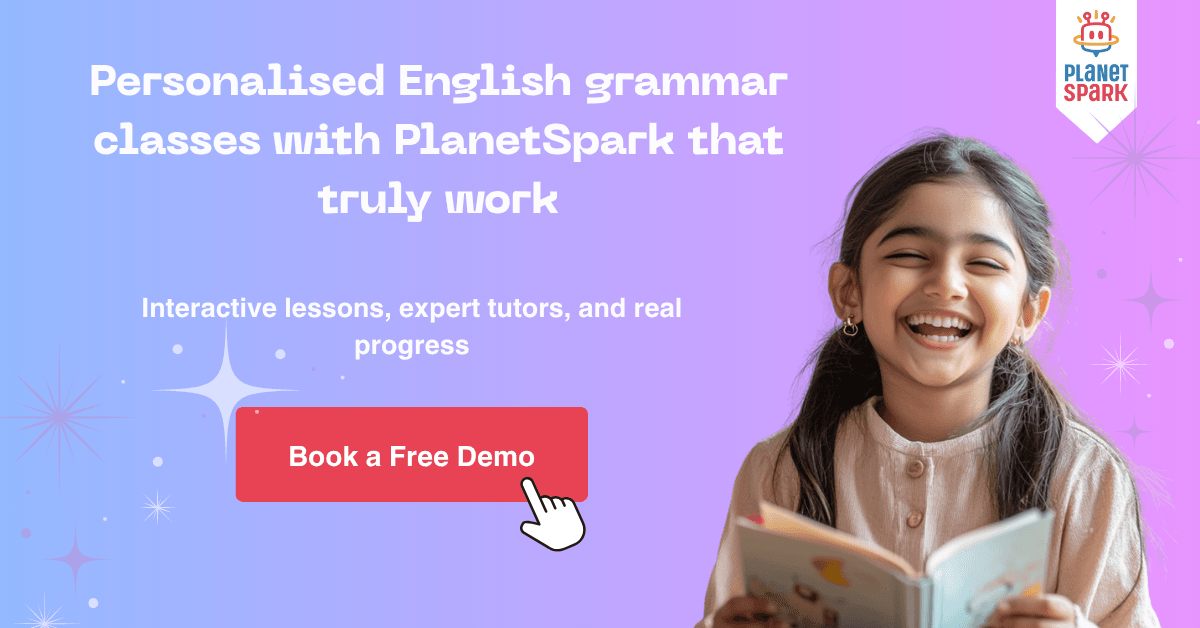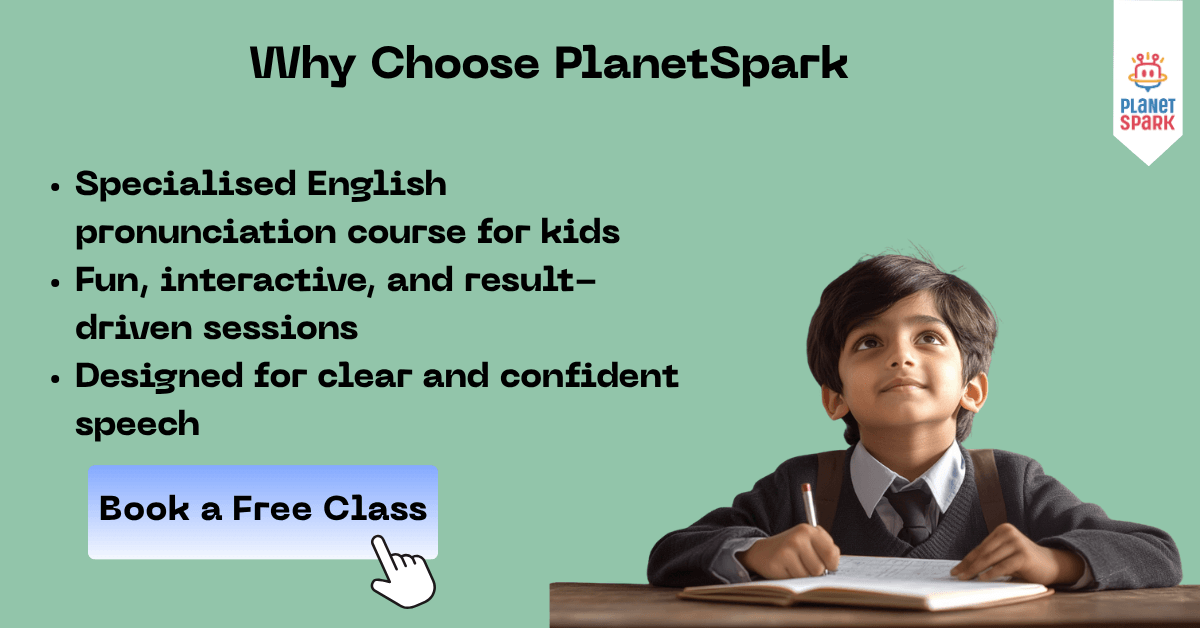Subject and Predicate Basics with Easy Examples

Table of Contents
- What is a Subject in Grammar?
- What is a Predicate in Grammar?
- Why Understanding Subject and Predicate Matters
- Types of Subjects
- Types of Predicates
- Advanced Understanding of Subjects
- Advanced Understanding of Predicates
- Common Errors Students Make with Subject and Predicate
- Subject and Predicate in Different Sentence Types
- Exercises for Practice
- Real-Life Applications of Subject and Predicate
- Tips and Tricks to Remember Subject and Predicate
- Examples from Literature and Famous Speeches
- Fun Activities for Students
- Why Choose PlanetSpark?
When learners search for subject and predicate, their main intent is simple: they want to understand what these two terms mean in English grammar and how they function in a sentence. Subject and predicate form the foundation of sentence structure, and without grasping them, it becomes challenging to write or speak correctly. This blog is designed to answer that intent by breaking down definitions, explaining concepts, and providing plenty of examples.
In the following sections, we will cover everything you need to know about subject and predicate basics. We’ll start by explaining their definitions, move into detailed examples, show the types of subjects and predicates, and highlight common mistakes learners make. We’ll also include practical exercises, tips for students, and even creative ways to remember grammar rules. By the end, you’ll not only know what is subject and a predicate are but also how to use them effectively in writing and speaking.

What is a Subject in Grammar?
The subject of a sentence is the part that tells us who or what the sentence is about. It is usually a noun or pronoun and can also include words that describe it. Without a subject, a sentence feels incomplete, because we don’t know what or who the sentence is focusing on.
For example:
- The dog barks loudly. → Here, the dog is the subject because it tells us who is doing the action.
- She sings beautifully. → She is the subject of the sentence.
In short, the subject answers the question: Who or what is the sentence about?
What is a Predicate in Grammar?
The predicate of a sentence tells us something about the subject. It usually begins with the verb and includes the action, state of being, or description connected to the subject. In simple terms, if the subject tells us who or what, the predicate tells us what about it.
For example:
- The dog barks loudly. → barks loudly is the predicate because it tells us what the dog is doing.
- She sings beautifully. → sings beautifully is the predicate because it tells us what she does.
Thus, subject and predicate always work together to make a complete sentence.
Why Understanding Subject and Predicate Matters
Understanding subject and predicate is essential because:
- It helps in building correct sentences.
- It improves spoken and written English.
- It makes reading comprehension easier.
- It forms the foundation for advanced grammar topics like clauses, voice, and reported speech.
For students, grasping this concept early prevents confusion later when sentences become more complex. Teachers often stress the importance of subjects and predicates because they are building blocks for learning all other grammar rules.
Types of Subjects
Not all subjects are simple one-word nouns. Subjects can take different forms depending on the sentence. Here are the main types:
1. Simple Subject
This is just the main word that the sentence is about, usually a noun or pronoun.
- Example: Cats sleep a lot.
2. Complete Subject
This includes the simple subject and all its modifiers.
- Example: The lazy cats in the garden sleep a lot.
3. Compound Subject
When two or more subjects share the same predicate.
- Example: Tom and Jerry are best friends.
By identifying these types, students can better analyze sentence structure and avoid mistakes.
Does your child struggle with sentence construction?
Types of Predicates
Just like subjects, predicates can also vary in form.
1. Simple Predicate
This is just the main verb or verb phrase.
- Example: She dances.
2. Complete Predicate
This includes the verb and all the words that modify it.
- Example: She dances gracefully at the annual show.
3. Compound Predicate
When two or more actions are connected to the same subject.
- Example: She dances and sings.
By learning these distinctions, students can recognize how different sentence structures communicate meaning more effectively.

Advanced Understanding of Subjects
In the first part, we introduced the idea of subjects and explained how they are central to building a sentence. Now, let’s move a step further into advanced subject types that appear in more complex writing and speech.
1. Hidden or Implied Subject
Sometimes the subject is not written directly but is understood.
- Example: (You) Sit down. → The subject “You” is implied.
2. Delayed Subject
In certain sentences, especially with “it” or “there,” the subject comes later in the sentence.
- Example: It is important to stay focused. → The true subject is to stay focused.
3. Subject in Interrogative Sentences
In questions, subjects are often placed after the verb.
- Example: Where are my keys? → Subject is my keys.
Advanced Understanding of Predicates
Just as subjects vary, predicates can also be more advanced than simple verb phrases.
1. Predicate with Complements
Some predicates need an object or complement to complete their meaning.
- Example: She became a doctor. → Predicate = became a doctor.
2. Predicate with Modifiers
Predicates often include adjectives, adverbs, or phrases that describe the action.
- Example: He ran quickly across the field.
3. Predicate in Passive Voice
Sometimes predicates shift focus from the doer to the receiver of the action.
- Example: The cake was baked by Mary.
Grammar mistakes hold back communication. Help your child master English with PlanetSpark.
Common Errors Students Make with Subject and Predicate
Even though the idea is simple, many students make recurring mistakes when identifying or writing subjects and predicates.
- Using incomplete subjects or predicates
- Wrong: Running fast. (Incomplete – missing subject)
- Correct: The boy is running fast.
- Confusing compound structures
- Wrong: Riya and playing football.
- Correct: Riya and Siya are playing football.
- Overlooking implied subjects in commands.
- Wrong: Should go now.
- Correct: (You) should go now.
Subject and Predicate in Different Sentence Types
Understanding how subjects and predicates function in different sentence styles is key for learners.
Declarative Sentences
These make a statement.
- Example: The sun sets in the west.
Interrogative Sentences
These ask questions.
- Example: Did you finish your homework?
Imperative Sentences
These give commands.
- Example: Close the door.
Exclamatory Sentences
These express strong emotions.
- Example: What a beautiful day it is.
Exercises for Practice
Here are some practice activities to test understanding:
- Identify the subject and predicate:
- The children are playing in the park.
- The train arrived late.
- Correct the errors:
- Eating pizza is delicious.
- The birds sing sweetly.
- Rewrite with compound structures:
- She dances. → She dances and sings.
Real-Life Applications of Subject and Predicate
Knowing subjects and predicates isn’t just an exam skill; it’s useful in daily life:
- In Public Speaking: Clear subject-predicate use makes speeches stronger.
- In Storytelling: Correct grammar keeps listeners engaged.
- In Writing Essays: Subjects and predicates build clarity and coherence.
For students, mastering this rule is the first step toward confident communication in both academic and social settings.

Tips and Tricks to Remember Subject and Predicate
Students often wonder how they can quickly identify the subject and predicate in any sentence. Here are some simple tips:
- Ask “Who?” or “What?” → The answer is the subject.
- Example: The teacher explained the lesson. → Who explained? → The teacher.
- Look for the verb first. → The predicate always starts with the verb.
- Example: Birds are flying in the sky. → Predicate starts with are flying.
- Check sentence balance. → A subject without a predicate, or vice versa, makes the sentence incomplete.
By practicing these tricks daily, students can identify subjects and predicates instantly, making grammar much easier.
Examples from Literature and Famous Speeches
Subjects and predicates aren’t just found in textbooks they appear in every form of writing and speech.
- From Literature:
- “All the world’s a stage.” (Shakespeare)
- Subject: All the world
- Predicate: is a stage
- “All the world’s a stage.” (Shakespeare)
- From Speeches:
- “I have a dream.” (Martin Luther King Jr.)
- Subject: I
- Predicate: have a dream
- “I have a dream.” (Martin Luther King Jr.)
These examples show how even great leaders and writers relied on clear subjects and predicates to convey powerful messages.
Fun Activities for Students
- Sentence Hunt: Give students a paragraph and ask them to highlight subjects in blue and predicates in green.
- Predicate Builder: Provide subjects and ask students to create interesting predicates. Example: Subject = The cat → Predicate = jumped onto the roof.
- Story Chain: Students form a story where each person adds a sentence with a clear subject and predicate.
These activities make grammar interactive and enjoyable while strengthening understanding.
PlanetSpark makes learning engaging.
The journey of understanding subject and predicate basics begins with simple definitions but extends into real-life applications, literature, and communication. By practicing regularly and applying rules in writing and speech, students can master sentence construction.
Remember, every great speech, essay, or story starts with clear subjects and predicates. Whether you’re a beginner or advancing into higher grammar, this concept is the key to confidence in English.
Why Choose PlanetSpark?
At PlanetSpark, we understand that English grammar forms the backbone of communication. Our programs go beyond textbooks, making grammar interactive, fun, and practical.
Here’s what we offer:
- Expert-designed curriculum for children from the basics to advanced grammar.
- Interactive activities like quizzes, games, and storytelling.
- Focus on real-life usage, not just memorization.
- Confidence-building exercises to prepare students for public speaking and writing.
With PlanetSpark, your child will not just learn grammar; they’ll learn how to use it effectively in every aspect of life.
Give them the power of confident grammar with PlanetSpark.
Frequently Asked Questions
The subject tells us who or what the sentence is about. Example: The boy runs fast. Subject = The boy.
The predicate tells us something about the subject, usually starting with the verb. Example: The boy runs fast. Predicate = runs fast.
Yes! This is called a compound subject. Example: John and Mary play chess.
Yes, that’s a compound predicate. Example: She sings and dances.
They are the foundation of sentence structure. Without them, a sentence is incomplete. Understanding them helps students write and speak correctly.
Download Free Worksheets
Personalized Communication Report
Record a video to get a AI generated personalized communication report for your child

Hi There, want to try these
tips for your child with
LIVE with our expert coach?
Let's check your child's
English fluency

